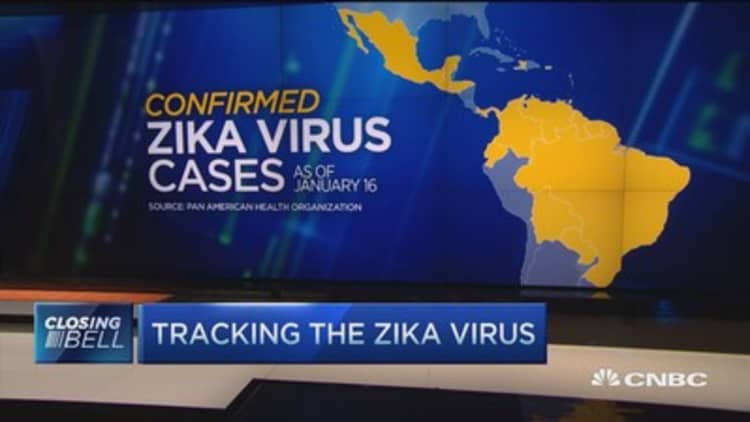
A new mosquito-borne virus is fast spreading across the Americas and the Caribbean, with cases reported among travelers returning to the U.S.
Zika virus outbreaks are proliferating across multiple countries and territories in the region, such as Puerto Rico, Mexico, Brazil, Panama and Venezuela. They have been associated with increased reports of birth defects, including babies with very small heads, and of paralysis in adults.
There is no vaccine or specific drug to treat the virus.
CNBC takes a look at the Zika virus.
How is Zika transmitted?
The virus is transmitted by the bite of Aedes aegypti mosquitos, which are found in all countries in the Americas, including the U.S., bar Canada and mainland Chile.
Reports that the disease can be transmitted by sex are unconfirmed by the World Health Organization or the U.S. Centers for Disease Control and Protection (CDC). It is unclear if the virus can be transmitted through human blood.
Aedes mosquitos also spread the more-common dengue fever and chikungunya. Zika symptoms are typically similar to these viruses, but milder, including fever and skin rash, usually accompanied by conjunctivitis and muscle or joint pain.
Birth defects, paralysis?
The outbreak has led to reports of increased numbers of women in Brazil giving birth to babies with microcephaly, a rare condition that causes the brain to develop abnormally in the womb and results in a very small head.
In addition, there are reports of adult Zika suffers subsequently developing Guillain-Barre syndrome, another rare but serious nervous system disorder that can cause muscle weakness, poor coordination and paralysis.
No direct links between Zika and Guillain-Barre syndrome have yet been established. It is unclear if the virus can be transmitted from mother to child during pregnancy or birth, although this is can occur with both dengue and chikungunya.
How the outbreak started
Zika was little known outside of Africa until Chile reported an outbreak on its remote Easter Islands in 2014. The first cases on mainland South America were reported in May 2015 and since then the virus has spread across countries, as far north as Mexico and to the Caribbean.
Guyana, Barbados, Suriname and Haiti have confirmed cases and in most other countries in the Caribbean there is a high chance of an outbreak, the Caribbean Public Health Agency said on Tuesday. The virus's novelty to the region means that "almost everybody" is susceptible, the body said.
Could it reach the US?
Cases among travelers returning to mainland U.S. have already been reported and these instances were seen increasing by the CDC, which has warned that imported cases could cause the virus to spread in some areas of the country.
The World Health Organization warned on Tuesday that the outbreak would likely reach all countries and territories in the Americas with Aedes mosquitos.
Prevention
People living in or visiting tropical areas with Aedes mosquitoes are advised to use insect repellent, wear long-sleeved, light-colored clothes and use insect screens or mosquito nets while inside.
To help control the mosquito population, people should cover domestic water tanks, unblock drains, avoid accumulating garbage and avoid allowing water to stagnate in outdoor containers such as flower pots.
Some affected countries have called on women to delay pregnancy because of the possible link to microcephaly. El Salvador has suggested that women wait until 2018, while Colombia, Ecuador and Jamaica (where the virus's presence is unconfirmed) have called for shorter delays, according to media reports.
Places with reported zika cases so far:
- Barbados
- Bolivia
- Brazil
- Cape Verde
- Colombia
- Dominican Republic
- Ecuador
- El Salvador
- French Guiana
- Guatemala
- Guadeloupe
- Guyana
- Haiti
- Honduras
- Martinique
- Mexico
- Panama
- Paraguay
- Puerto Rico
- Saint Martin
- Samoa
- Suriname
- Venezuela.

